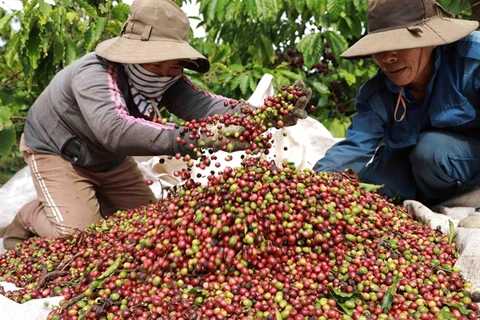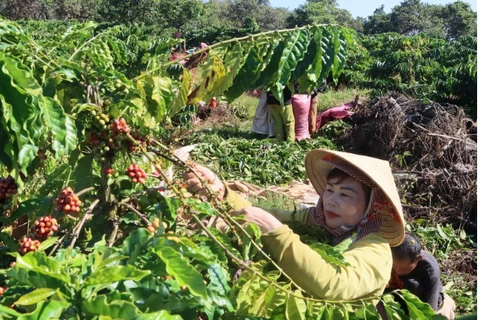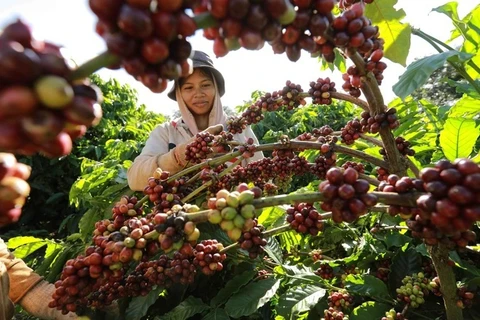Hanoi (VNA) - The prices of Vietnamese coffee are forecast to continue to increase next year due to severe supply shortage, according to the Vietnam Coffee-Cocoa Association (Vicofa).
Coffee prices were around 67,200 – 68,000 VND per kilogram in Tay Nguyen (Central Highlands) provinces of Lam Dong, Dak Lak and Dak Nong, about 900 -1,000 VND per kg higher than last week and 8,000 VND more than early December.
According to Mercantile Exchange of Vietnam, for the week ending December 24, coffee prices increased by 1.85% for Arabica and 0.42% for Robusta.
Farmers are delaying their sales with expectations of higher prices.
Despite being good news to farmers, high coffee prices push export enterprises into a lot of difficulty in collecting enough coffee for their signed contracts.
Vicofa’s Vice President Do Ha Nam said that unpredictable coffee price fluctuations caused difficulties for exports. In the 2022-23 crop, several domestic exporters could not deliver in time because of rising prices, partly as an impact of hoarding. “During the past three decades, never have we thought that Vietnam could be in a shortage of coffee,” Nam said.
The association has estimated that the coffee shortage of signed contracts is around 80,000 – 150,000 tonnes, waiting for the coming harvest season to be fulfilled.
Vietnam exported more than 120,000 tonnes of coffee in November, half of which was to fulfull orders of the previous harvest crop, he said.
Coffee prices are forecast to be around 60,000 – 70,000 VND per kg in the coming months and are expected to decrease when Indonesia and Brazil start new coffee harvest seasons in April and May.
In the new crop, the asking prices of green coffee reached 60,000 VND per kg for delivery in December 2023 and January 2024 – an unprecedented price recorded at the beginning of harvest season due to high purchasing demand from export enterprises who are worried that there would be no coffee to buy from April or May next year. In 2023, coffee was out of stock from June.
According to Vicofa the European markets are the largest market for Vietnamese coffee, which consume around 40-50% of the country’s exports and still have good demand for coffee.
A report about the coffee market by the US Department of Agriculture (USDA) issued last week showed that the global coffee inventory was estimated at 26.5 million 60-kg bags, 16.7% lower than the previous estimate and the lowest inventory level in the past 12 years.
The USDA forecasts that world coffee production for 2023-24 will reach 171.4 million bags, 6.9 million bags higher than the previous crop.
Vietnam production is forecast to add 300,000 bags to reach 27.5 million. The cultivated area is forecast to remain unchanged, with nearly 95% of total output remaining as Robusta. However, with lower total supplies due to last year’s stock drawdown, bean exports are forecast to decline by 2.4 million bags to 23 million, according to the USDA’s report.
In the context of tense supply, Nam said that Vietnam is focusing on solutions to promote the sustainable development of the coffee industry, including ensuring origin traceability and meeting the EU’s regulations on deforestation./.
Coffee prices were around 67,200 – 68,000 VND per kilogram in Tay Nguyen (Central Highlands) provinces of Lam Dong, Dak Lak and Dak Nong, about 900 -1,000 VND per kg higher than last week and 8,000 VND more than early December.
According to Mercantile Exchange of Vietnam, for the week ending December 24, coffee prices increased by 1.85% for Arabica and 0.42% for Robusta.
Farmers are delaying their sales with expectations of higher prices.
Despite being good news to farmers, high coffee prices push export enterprises into a lot of difficulty in collecting enough coffee for their signed contracts.
Vicofa’s Vice President Do Ha Nam said that unpredictable coffee price fluctuations caused difficulties for exports. In the 2022-23 crop, several domestic exporters could not deliver in time because of rising prices, partly as an impact of hoarding. “During the past three decades, never have we thought that Vietnam could be in a shortage of coffee,” Nam said.
The association has estimated that the coffee shortage of signed contracts is around 80,000 – 150,000 tonnes, waiting for the coming harvest season to be fulfilled.
Vietnam exported more than 120,000 tonnes of coffee in November, half of which was to fulfull orders of the previous harvest crop, he said.
Coffee prices are forecast to be around 60,000 – 70,000 VND per kg in the coming months and are expected to decrease when Indonesia and Brazil start new coffee harvest seasons in April and May.
In the new crop, the asking prices of green coffee reached 60,000 VND per kg for delivery in December 2023 and January 2024 – an unprecedented price recorded at the beginning of harvest season due to high purchasing demand from export enterprises who are worried that there would be no coffee to buy from April or May next year. In 2023, coffee was out of stock from June.
According to Vicofa the European markets are the largest market for Vietnamese coffee, which consume around 40-50% of the country’s exports and still have good demand for coffee.
A report about the coffee market by the US Department of Agriculture (USDA) issued last week showed that the global coffee inventory was estimated at 26.5 million 60-kg bags, 16.7% lower than the previous estimate and the lowest inventory level in the past 12 years.
The USDA forecasts that world coffee production for 2023-24 will reach 171.4 million bags, 6.9 million bags higher than the previous crop.
Vietnam production is forecast to add 300,000 bags to reach 27.5 million. The cultivated area is forecast to remain unchanged, with nearly 95% of total output remaining as Robusta. However, with lower total supplies due to last year’s stock drawdown, bean exports are forecast to decline by 2.4 million bags to 23 million, according to the USDA’s report.
In the context of tense supply, Nam said that Vietnam is focusing on solutions to promote the sustainable development of the coffee industry, including ensuring origin traceability and meeting the EU’s regulations on deforestation./.
VNA

























